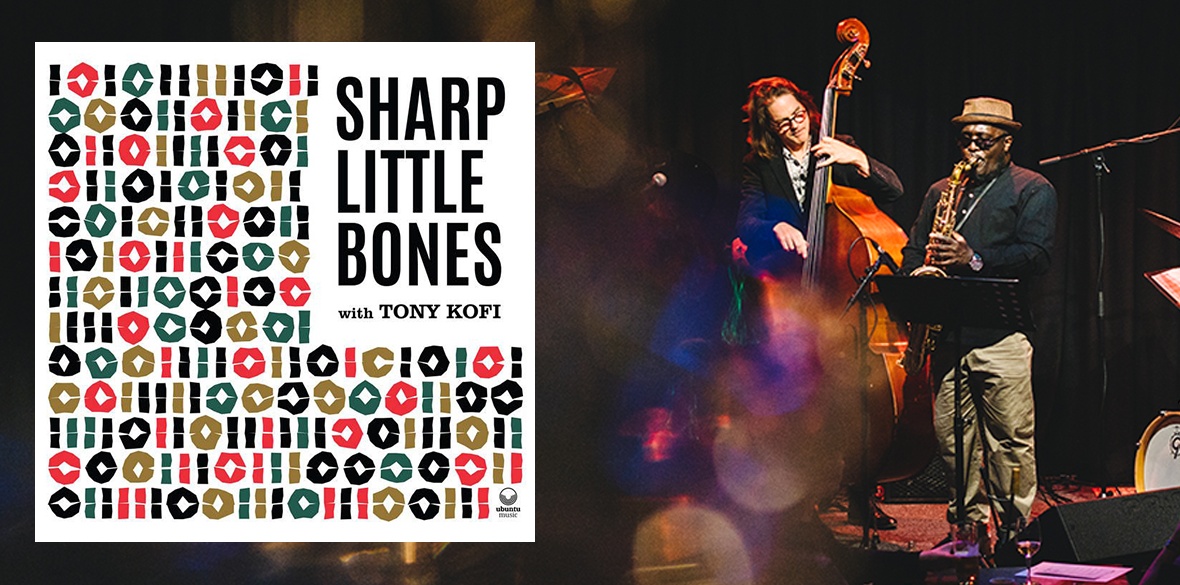This is the last article you can read this month
You can read more article this month
You can read more articles this month
Sorry your limit is up for this month
Reset on:
Please help support the Morning Star by subscribing here
NOTTINGHAM is a groovy city and a special place for jazz. In the past there was the Golden Slipper, and now there is Peggy’s Skylight, a forum of new and audacious sounds. Led by a quartet called Sharp Little Bones, Peggy’s is a tryst of delights in the very beating musical heart of England.
One of its instigators is bassist, composer and leader of Nottingham University’s Music and Music Technology degree course, Simon Paterson, who with pianist Paul Deats and drummer Andrew Wood established a swinging trio, mainly playing Herbie Hancock tunes and new compositions by Paterson.
But it was when they invited the city’s prime saxophonist, Tony Kofi, a powerful, Ghana-rooted hornman, to form a quartet that the creative sparks really began to fly.
Kofi’s jazz story is an inspiring one. When he left school, he trained and worked as a carpenter, but suffered serious injuries when he fell from a roof. As he fell, he had a visionary moment, visualising himself as a jazz saxophonist, and as his injuries healed he threw himself into mastering the instrument.
I have heard him many times in live performances. A protean and brilliant saxophonist, any music he plays comes alive with dazzling sound and a powerfully improvising spirit.
I asked both Paterson and Kofi about the debut double album of Sharp Little Bones. What were the origins of the band, and is there an identifiable Nottingham jazz sound?
“Nottingham has a hugely eclectic sound,” says Paterson, “spanning genres. Sharp Little Bones is rooted in bop and post-bop traditions. I describe myself as a jazz musician but I’ve spent a lifetime absorbing music in all its forms, from classical to soul, electronic to pop. All this, and much more, feeds into our music.”
Their album is alive with sparkling melodism. Hear the marvellously agile Kofi on Stranger Danger, Downfall or Roo’s Blues. Deats takes his own fire on Chromatose and Blue Finger and the magnetic theme of Mackerel Sky has the Quartet playing as if were an age-old melody rather than one of Paterson’s freshly minted themes.
“I strive to write melodic, catchy music with bass-led, rhythmic grooves that tread the line between simplicity and originality.”
What was it like, suddenly having Kofi supplementing the trio? “When you play with Tony, he has an infectious way of tuning into the musicians, in terms of both vibe and tonality, as well as soaring above and taking the rest of us with him. He's opened up a world of sonic possib[ities, with many more textures and colours to explore.”
As for Kofi, he attested: “I’ve always kept my roots in Nottingham, be it performing, teaching or mentoring, even though I left 30 years ago. So it was an honour to be asked to do this project of great compositions by great musicians.”
And what was it like, being part of a band from his home city, playing their own tunes in their own way? “It’s quite easy,” he says. “I didn’t just turn up and play. My approach is to tune into the frequency and vibration of the musicians and become a part of their ensemble. I do a lot of research and listening too. When I joined the World Saxophone Quartet, Abdullah Ibrahim’s Ekaya, or Sam Rivers’s Rivbea Big Band, or was playing with Andrew Hill or recording a studio album with Ornette Coleman, I turned up to rehearsals, bandstand or studio so I could perform at my best without being instructed what to play.
“It was the same with Sharp Little Bones and their great compositions: my improvisational approach was to be more melodic and play variations of their tunes.”
Pointing out to Paterson that his bass playing reminded me of the Duane Eddy records that I loved as a teenager, he replies: “I didn't play bass until I was 18. Before that I was listening to a lot of saxophonists and trumpeters — mainly Miles. Then when I heard Jaco Pastorius’s bass for the first time, I was hooked … in awe of how he could play such beautiful melodies as well as really dig into the groove. His musicianship continues to inspire me.”
And why the name Sharp Little Bones? Paterson says he wanted the antithesis of “smooth” in the quartet’s music and a name that expressed “the sound of a whole group playing, with many aspects of the music and arrangements made democratic. It’s a name that conveys energy and rhythm.”
There’s plenty of both in the double album, contributing to a whole new sound from Nottingham, and a swinging new artistry.
Sharp Little Bones is released by Ubuntu Records











